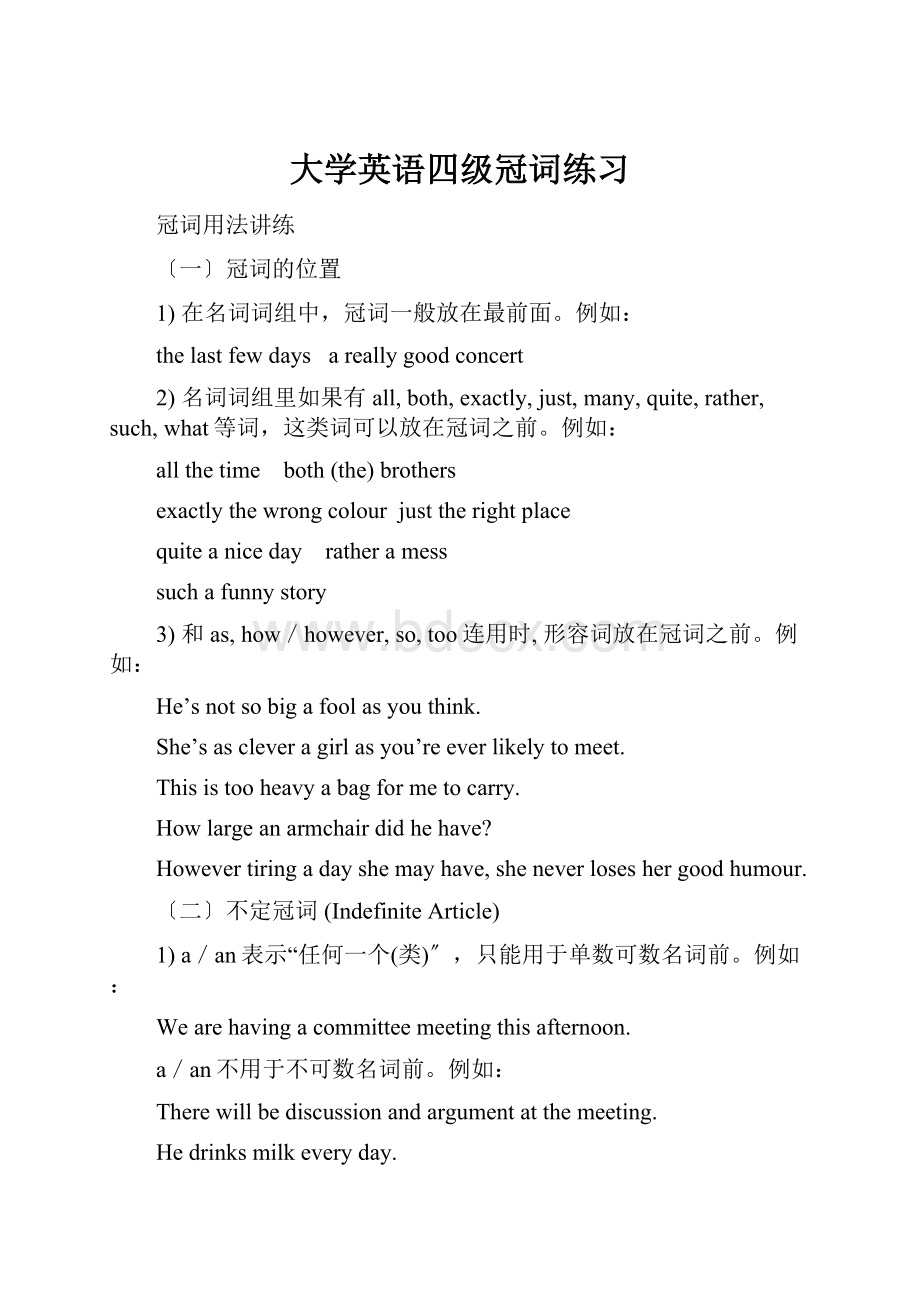大学英语四级冠词练习.docx
《大学英语四级冠词练习.docx》由会员分享,可在线阅读,更多相关《大学英语四级冠词练习.docx(16页珍藏版)》请在冰豆网上搜索。

大学英语四级冠词练习
冠词用法讲练
〔一〕冠词的位置
1)在名词词组中,冠词一般放在最前面。
例如:
thelastfewdaysareallygoodconcert
2)名词词组里如果有all,both,exactly,just,many,quite,rather,such,what等词,这类词可以放在冠词之前。
例如:
allthetimeboth(the)brothers
exactlythewrongcolourjusttherightplace
quiteanicedayratheramess
suchafunnystory
3)和as,how/however,so,too连用时,形容词放在冠词之前。
例如:
He’snotsobigafoolasyouthink.
She’sascleveragirlasyou’reeverlikelytomeet.
Thisistooheavyabagformetocarry.
Howlargeanarmchairdidhehave?
Howevertiringadayshemayhave,sheneverloseshergoodhumour.
〔二〕不定冠词(IndefiniteArticle)
1)a/an表示“任何一个(类)〞,只能用于单数可数名词前。
例如:
Wearehavingacommitteemeetingthisafternoon.
a/an不用于不可数名词前。
例如:
Therewillbediscussionandargumentatthemeeting.
Hedrinksmilkeveryday.
2)不可数名词用作可数名词时,可用a/an。
例如:
I’vejustboughtalovelybigDanishcheese.
Idon’tlikecheese.
Shewasinspiredwithanewcourage.
Sheshowedgreatcourage.
3)用于表示价格、速度、比率等名词前,如fivepenceakilo,sixtykilometersanhour,fourtimesaday等。
4)用于以下这样的固定短语中。
如acouple,adozen,halfadozen,ahundred,alotof,agreatmany,agreatdealof,alargeamount/quantityof,agoodnumberof等。
I’vedoneagreatdealofworktoday.(不可数)
Whatalargenumberofbooksyouhave!
(可数)
It’sagoodfivemiles(=atleastfivemiles,perhapsmote)tothestation.
5)以元音开头的单词前不定冠词用an,如:
anapple,anegg,anitem,anoldman,anumbrella,anhour;以辅音开头的单词前不定冠词用auniversitystudent,ahumorousman。
EXERCISEl
A.Putaoranbeforeeachofthefollowing:
1.motel(汽车游客旅馆)2.unusualapproach
3.honestboy4.awkwardsituation
5.exit(出口)6.urgentmessage
7.uniqueopportunity8.extremelyexcitingfilm
B.TranslatethefollowingintoEnglish:
1.一座新办公楼2.一位旅行社代理人
3.一位美国科学家4.一天的郊游
5.一张印度邮票6.一次心脏病发作
7.一个先进国家8.一个有意思的剧本
EXERCISE2
Fillintheblankswithaoranwherenecessary:
1.Telephoneisveryimportantmeansofcommunication.
2.Mothersoftentellsmallchildrenstoriesbeforebedtime.
3.I'llpayyouthousandyear.It’snotenormoussalarybutafterallyouarecompletelyunskilledworker.
4.—You’11getshockifyoutouchlivewirewiththatscrewdriver(螺丝起子).Whydon’tyougetscrewdriverwithinsulated(绝缘的)handle?
5.—I’mnotwage-earner;I’mself-employedman.Ihavebusinessofmyown.
—Thenyou’renotworker;You’recapitalist!
6.—Ihavehourandhalfforlunch.
—Ionlyhavehalfhour—barelytimeforsmokeandcupofcoffee.
7.Ittravelsatjustunderthousandmileshour.
8.Ihaveneverknownsuchhotweather.
EXERCISE3
Insertaoranwherenecessary:
A.
1.Ihadverybadnight;Ididn’tsleepwink(眨眼;打盹).
2.Thismanhashonestythatweallappreciated.
3.Mr.BrownhadvisionofnewandhappierEurope.
4.It’stimeyouhadholiday.Youhaven’thaddayoffformonth.
5.Thereishourlyserviceofbusesinthisroute.
6.Itisgreathonourtobeinvitedtosuchgathering.
7.1wouldn’tclimbmountainfor$1,000!
Ihavehorrorofheights.
8.Childrenusuallylearnthedifferencebetweenrightandwrongatearlyage.
9.Ican’ttellyoudefinitelyyet.I'llhavewordwithmywifeaboutitandtellyouourdecisiontomorrow.
10.Ifboyisnotmakingsatisfactoryprogressatschool,hisparentsshouldseekadvicefromhisteacher.
B.
1.Thisisbigproblem,butnottoobigproblemforustosolve.
2.Hehadsquarenose,greyhairandbrownskin.Shehadneverseensohandsomeman.
3.Howevergreatdisasterhesuffered,Johnnevergaveup.
4.Manyshipwreckedsailorhasbeenrescuedbyourbravecoastguards(海岸警卫队).
5.Suchurgentneedrequirespromptaction.
6.Sourgentneedrequirespromptaction.
7.ThisisaslovelypictureasIhaveeverseen.
8.Idon’tthinkyourealizewhatseriouscrisisthisis.
9.Youcanhardlyhopetosucceedwheremanygreatermanhasfailed.
10.Howseriouscrimehadbeencommittedwasnotrealizeduntilmuchlater.
〔三〕定冠词(DefiniteArticle)
1)定冠词的根本特性
实际上所有名词〔专有名词将另行讨论〕前都可能用定冠词the。
究竟用不用定冠词,主要取决于我们所表达的思想。
如果我们要给予某个名词以明确的、限定的、特指的意义,就用the;反之,就不用the。
请看以下句子:
1
2
Ilovebooks.
Putthebooksontheshelf.
Butterisnotcheap.
ThebutterIboughtisnotcheap.
Hewenttoworkbycar.
Herodetoworkinthenewcar.
Hehasgainedstrength.
Hehasregainedthestrengthhelost.
Ilikemusic.
Ilikethemusiccomposedbytheyoungman.
a)一般用于带有修饰语的名词词组前,但并非所有带修饰语的名词都需要the。
例如:
Don’tyouthinkGeorgianhousesareabsolutelylovely?
Stainlesssteel(不锈钢器皿)hasmanyuses.
Ican’tsayIcareformodernart.
上面三句中斜体局部的名词虽然都有修饰语,因没有明确限定而是泛指一类事物,故不用the。
下面三句斜体局部的名词那么表示提到过的,特指的事物,要用the:
TheGeorgianhouseshavebeensold.
Thestainlesssteelwasbeautiful,butIthoughtmostoftheglass〔玻璃器皿〕theyexhibitedwasratherunimaginative.
Theyshowedawonderfulselectionoftheimpressionists,butthemodernartwastoolimitedinitsrange.
b)也用于有后置修饰语的名词词组前。
例如:
TheoldhouseswhicharemostworthvisitingareintheImperialCity.
Thesteelofthegunbarrelshasgonerusty.
Theartoftheeighteenthcenturyhasneverbeensurpassed〔超过〕.
上面三句中的形容词从句和介词短语明确了是什么样的房子〔whathouses〕,什么样的钢〔whatsteel〕和什么样的艺术〔whatart〕,故用the。
下面三句同样有形容词从句和介词短语修饰名词,但是它们只指这些名词属于某一类事物,并非特指,故不用the。
例如:
Houseswhichfailtosatisfytheseminimumrequirementsaretobepulleddown.
Steelofgreatstrengthisneededforthemanufactureofguns.
Artintheeighteenthcenturyprobablyplayedamoreimportantpartinpeople’slivesthanitdoestoday.
EXERCISE4
Fillintheblankswiththewherenecessary:
1.Theengineersfoundthatsteelwasofinsufficientlyhighquality.Steel,Isuppose,isthemostimportantsingleproductofthemodernindustrialworld.
2.Largeforestscanhaveanimportantinfluenceonclimate.
Forestshaveallbeencutdown.
3.Naturewasprobablyhischiefsourceofinspiration〔灵感,鼓舞〕.
Natureoftheproblemwassuchastoarousehisinterest.
4.Educationoflittlechildrenhasbeengreatlyneglected.
Publiceducationmustbegreatlyextended.
5.Theexploration〔探索〕ofspacehasbecomeoneofthechieftopicsofsciencefiction〔科幻小说〕.
Spacebetweenthetableandthewallwasjustbigenoughforasmallbed.
6.Ipreferclassicalmusictopopmusic.
Filmwasn’tverygoodbutIlikedmusic.
7.Myfavouritesubjectatschoolwashistory.
Allstudentsshouldknowsomethingabouthistoryoftheirowncountry.
8.Icannotjudgeaccuracyofyourcalculations〔计算〕.
Inmathematicsaccuracyisessential.
2)定冠词的主要用法
a)用于单数名词前,表示“某一类人或物〞,以区别于其他人或物。
例如:
Thetigerisafierce〔凶猛的〕animal.〔相当于Atigerisafierceanimal.或Tigersarefierceanimals.〕
Inthistribethewomangoesouthuntingandthemanstaysathometolookafterthechildren.
下面三句中的斜体局部不能互换:
Whoinventedtheradio?
〔指类别〕
Whohadaradio?
〔指同类中的任何一个〕
Whomanufacturedradios?
〔指这一类中的所有个体〕
man指“人类〞时,不用the。
例如:
Manwillconquernature.
b)用于指世上独一无二的东西,如themoon,thesun,theworld等。
c)用于表示“乐器〞的名词前,但一般不用于表示“体育运动〞的名词前。
例如:
Canyouplaytheguitar?
Iplayfootballeveryday.
d)用于某些形容词前,可表示“一类人〞。
例如:
Theyoungareimpatient;theywantchanges.
e)一般不用于表示“疾病〞的名词前。
例如:
I’mjustrecoveringfromrheumatism〔风湿病〕.
以下病名前一般用a/an:
Ihaveanacheinmyhead(apainintheneck).
Hehasacold/afever.
特指时需要用the。
例如:
Jimhasneverreallygotoverthemalaria〔疟疾〕hecaughtintheEast.
f)一般不用于表示“膳食〞的名词前,但有形容词修饰时用the。
例如:
Breakfastisservedateight.
Theweddingbreakfastwasheldinherfather’shouse.
如果泛指,用a/an。
例如:
Hegaveusagoodbreakfast.
g)bed,church,college,court,hospital,market,prison,school,sea和work等名词用来指有关活动时,一般不用冠词。
例如:
It’stimeforchildrentogotobed.〔指tosleep〕
HegoestochurcheverySunday.〔指topray〕
Afterthecrash,sevenpeopleweretakentohospital.〔指tobecured〕
Hespentsixmonthsinprison.〔指tobepunished〕
AfterIleaveschool,Iwanttogoto(a)university.〔指tostudy〕
Kenisaseaman.Hespendsmostofhislifeatsea.〔指tosail〕
注:
在美国英语中,通常用a/thehospital,auniversity。
出于其他目的,如去参观、访问这些地方或谈到这些地方时,根据情况用a或the。
例如:
Thereisabedintheroom.
Shewasputtingcleansheetsonthebed.
Theworkmenwenttothechurchtorepairtheroof.
Tomwenttotheprisontovisithisbrother.
Iwouldlovetolivenearthesea.
home单独使用时,无冠词;有修饰语时,用the或a。
例如:
Shelefthome.
Wewenttothebride'shome.
Idon’thaveahometogotointhiscity.
h)当cinema,theatre,radio等名词用于表示“看电影、看戏、听无线电〞时,一般要用the。
例如:
Wewenttothecinemalastnight.
Doyouoftengotothetheatre?
Iheardthenewsontheradio.
television用于表示“看电视〞时不用the。
例如:
Iwatchedthenewsontelevision.
指“电视机〞时用the。
例如:
Canyouturnoffthetelevision,please?
(=thetelevisionset)
注:
许多固定词组中的名词前通常没有冠词,需要熟记,如dayafterday,husbandandwife,fatherandson,lockandkey,heavenandhell等。
EXERCISE5
A.Fillintheblankswithaorthewherenecessary:
1.Afterlunch,wewentforwalkbysea.
2.Steam-enginewasinventedbeforeinternalcombustionengine〔内燃机〕.
3.Bat,theysay,judgesdistancesbykindofecho-location.
4.HegoestochurcheverySunday;churchheusuallygoestohasseatsforoverthousand.
5.ThisismostusefulreferencebookIhaveonthissubject.
6.Wehavegoodmarketintownwherewebuyourfruitand_______vegetables.
7.Prisoninthistownisgrim-lookingbuilding.
8.Youngestboyhasjuststartedgoingtoschool;eldestboyisatcollege.
9.Deadnolongerneedhelp.Wemustconcernourselveswithliving.
10.Johnbecamemanagerandsecretaryofthecompanysametime.
B.Insertaorthewherenecessary:
1.Horseisnobleanimalandfaithfulservantofman.
2.Chessisgamewhichrequiresgreatskillandpatience.
3.Thestrangerwenttoschooltocomplainaboutbehaviour〔行为〕of